苏教牛津小学英语6b词组句子语法
- 格式:doc
- 大小:80.50 KB
- 文档页数:19
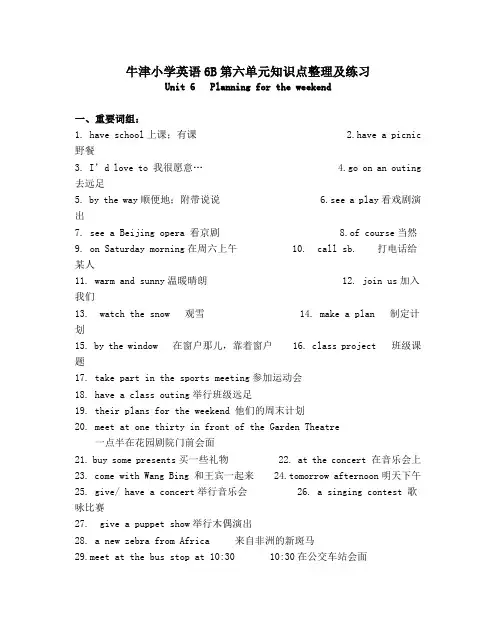
牛津小学英语6B第六单元知识点整理及练习Unit 6 Planning for the weekend一、重要词组:1. have school上课;有课2.have a picnic野餐3. I’d love to 我很愿意…4.go on an outing去远足5. by the way顺便地;附带说说6.see a play看戏剧演出7. see a Beijing opera 看京剧 8.of course当然9. on Saturday morning在周六上午 10. call sb. 打电话给某人11. warm and sunny温暖晴朗 12. join us加入我们13. watch the snow 观雪 14. make a plan 制定计划15. by the window 在窗户那儿,靠着窗户 16. class project 班级课题17. take part in the sports meeting参加运动会18. have a class outing举行班级远足19. their plans for the weekend 他们的周末计划20. meet at one thirty in front of the Garden Theatre一点半在花园剧院门前会面21.buy some presents买一些礼物 22. at the concert 在音乐会上23. come with Wang Bing 和王宾一起来 24.tomorrow afternoon明天下午25. give/ have a concert举行音乐会 26. a singing contest 歌咏比赛27. give a puppet show举行木偶演出28. a new zebra from Africa 来自非洲的新斑马29.meet at the bus stop at 10:30 10:30在公交车站会面30. the girl with the yellow bowl 端着黄碗的女孩二、句型:1. 一般将来时 be going to (表示“打算、将要、准备去做某事”)询问“某人打算干什么”及其应答:----What are we/you going to do?----We’re/I’m going to+动词原形/地点+时间---What are you going to do at 10:15 tomorrow morning?----I’m going to…----What is he/she/Liu Tao going to do?----He/She is going to…----What are Liu Tao and Tom going to do?----They are going to…其它特殊疑问句:----Where are you going? ----I’m going to Hongmei Park.----What time are you going to come home? ----At 4:30, I think.----When are they going to meet?----They’re going to meet at 1:30.Will 近似于 be going to, 但在具体使用的时候意义上还是有所不同的。
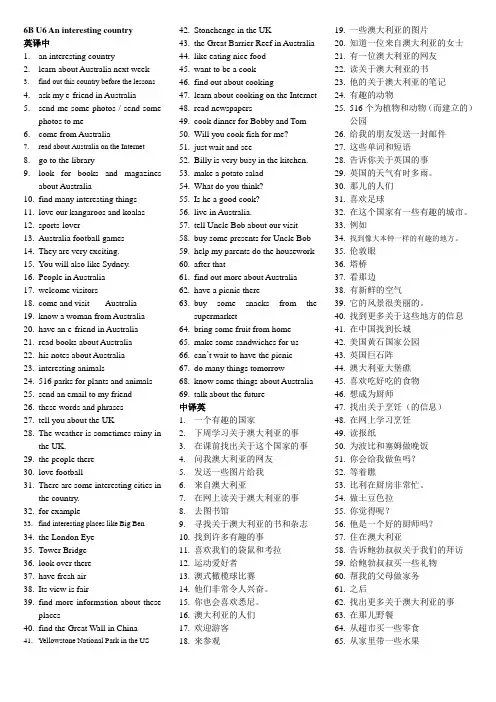
6B U6 An interesting country英译中1.an interesting country2.learn about Australia next week3.find out this country before the lessons4.ask my e-friend in Australia5.send me some photos / send somephotos to mee from Australia7.read about Australia on the Internet8.go to the library9.look for books and magazinesabout Australia10.find many interesting things11.love our kangaroos and koalas12.sports-lover13.Australia football games14.They are very exciting.15.You will also like Sydney.16.People in Australia17.welcome visitorse and visit Australia19.know a woman from Australia20.have an e-friend in Australia21.read books about Australia22.his notes about Australia23.interesting animals24.516 parks for plants and animals25.send an email to my friend26.these words and phrases27.tell you about the UK28.The weather is sometimes rainy inthe UK.29.the people there30.love football31.There are some interesting cities inthe country.32.for example33.find interesting places like Big Ben34.the London Eye35.Tower Bridge36.look over there37.have fresh air38.Its view is fair39.find more information about theseplaces40.find the Great Wall in China41.Yellowstone National Park in the US 42.Stonehenge in the UK43.the Great Barrier Reef in Australia44.like eating nice food45.want to be a cook46.find out about cooking47.learn about cooking on the Internet48.read newspapers49.cook dinner for Bobby and Tom50.Will you cook fish for me?51.just wait and see52.Billy is very busy in the kitchen.53.make a potato salad54.What do you think?55.Is he a good cook?56.live in Australia.57.tell Uncle Bob about our visit58.buy some presents for Uncle Bob59.help my parents do the housework60.after that61.find out more about Australia62.have a picnic there63.buy some snacks from thesupermarket64.bring some fruit from home65.make some sandwiches for us66.can’t wait to have the picnic67.do many things tomorrow68.know some things about Australia69.talk about the future中译英1.一个有趣的国家2.下周学习关于澳大利亚的事3.在课前找出关于这个国家的事4.问我澳大利亚的网友5.发送一些图片给我6.来自澳大利亚7.在网上读关于澳大利亚的事8.去图书馆9.寻找关于澳大利亚的书和杂志10.找到许多有趣的事11.喜欢我们的袋鼠和考拉12.运动爱好者13.澳式橄榄球比赛14.他们非常令人兴奋。
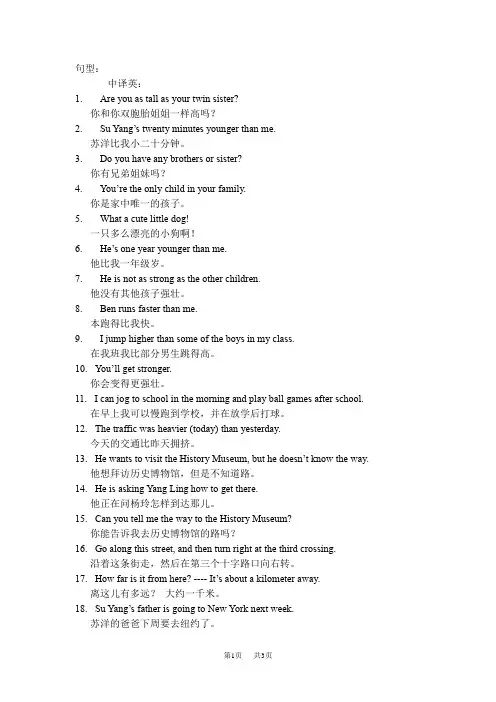
句型:中译英:1.Are you as tall as your twin sister?你和你双胞胎姐姐一样高吗?2.Su Yang’s twenty minutes younger than me.苏洋比我小二十分钟。
3.Do you have any brothers or sister?你有兄弟姐妹吗?4.You’re the only child in your family.你是家中唯一的孩子。
5.What a cute little dog!一只多么漂亮的小狗啊!6.He’s one year younger than me.他比我一年级岁。
7.He is not as strong as the other children.他没有其他孩子强壮。
8.Ben runs faster than me.本跑得比我快。
9.I jump higher than some of the boys in my class.在我班我比部分男生跳得高。
10.You’ll get stronger.你会变得更强壮。
11.I can jog to school in the morning and play ball games after school.在早上我可以慢跑到学校,并在放学后打球。
12.The traffic was heavier (today) than yesterday.今天的交通比昨天拥挤。
13.He wants to visit the History Museum, but he doesn’t know the way.他想拜访历史博物馆,但是不知道路。
14.He is asking Yang Ling how to get there.他正在问杨玲怎样到达那儿。
15.Can you tell me the way to the History Museum?你能告诉我去历史博物馆的路吗?16.Go along this street, and then turn right at the third crossing.沿着这条街走,然后在第三个十字路口向右转。
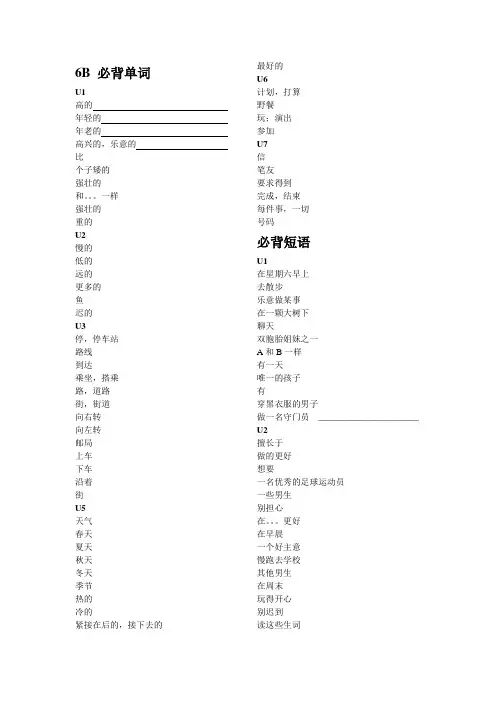
6B 必背单词U1高的年轻的年老的高兴的,乐意的比_________________________________ 个子矮的___________________________ 强壮的_____________________________ 和。
一样_________________________ 强壮的_____________________________ 重的_______________________________ U2慢的_______________________________ 低的_______________________________ 远的_______________________________ 更多的_____________________________ 鱼_________________________________ 迟的_______________________________ U3停,停车站_________________________ 路线______________________________ 到达_______________________________ 乘坐,搭乘_________________________ 路,道路___________________________ 街,街道___________________________ 向右转_____________________________ 向左转_____________________________ 邮局_______________________________ 上车_______________________________ 下车_______________________________ 沿着_______________________________ 街_________________________________ U5天气_______________________________ 春天_______________________________ 夏天_______________________________ 秋天_______________________________ 冬天_______________________________ 季节_______________________________ 热的_______________________________ 冷的_______________________________ 紧接在后的,接下去的_______________ 最好的____________________________U6计划,打算________________________野餐______________________________ 玩;演出__________________________参加______________________________U7信________________________________笔友______________________________要求得到__________________________完成,结束________________________每件事,一切______________________号码______________________________ 必背短语U1在星期六早上_________________________ 去散步_______________________________ 乐意做某事___________________________ 在一颗大树下_________________________ 聊天_________________________________ 双胞胎姐妹之一_______________________ A和B一样___________________________ 有一天_______________________________ 唯一的孩子___________________________ 有___________________________________ 穿黑衣服的男子_______________________ 做一名守门员_________________________ U2擅长于_______________________________ 做的更好_____________________________ 想要_________________________________ 一名优秀的足球运动员_________________ 一些男生_____________________________ 别担心_______________________________ 在。
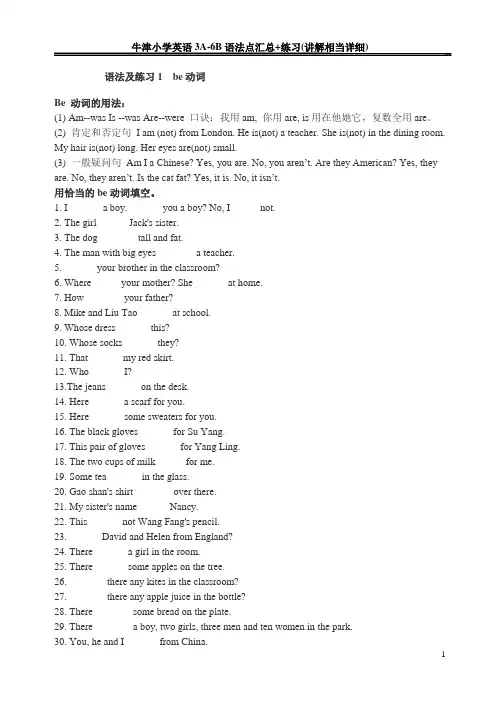
语法及练习1 be动词Be 动词的用法:(1) Am--was Is --was Are--were 口诀:我用am, 你用are, is用在他她它,复数全用are。
(2) 肯定和否定句I am (not) from London. He is(not) a teacher. She is(not) in the dining room. My hair is(not) long. Her eyes are(not) small.(3) 一般疑问句Am I a Chinese? Yes, you are. No, you aren’t. Are they American? Yes, they are. No, they aren’t. Is the cat fat? Yes, it is. No, it isn’t.用恰当的be动词填空。
1. I ______ a boy. ______ you a boy? No, I _____ not.2. The girl______ Jack's sister.3. The dog _______ tall and fat.4. The man with big eyes _______ a teacher.5. ______ your brother in the classroom?6. Where _____ your mother? She ______ at home.7. How _______ your father?8. Mike and Liu Tao ______ at school.9. Whose dress ______ this?10. Whose socks ______ they?11. That ______ my red skirt.12. Who ______ I?13.The jeans ______ on the desk.14. Here ______ a scarf for you.15. Here ______ some sweaters for you.16. The black gloves ______ for Su Yang.17. This pair of gloves ______ for Yang Ling.18. The two cups of milk _____ for me.19. Some tea ______ in the glass.20. Gao shan's shirt _______ over there.21. My sister's name ______Nancy.22. This ______ not Wang Fang's pencil.23. ______ David and Helen from England?24. There ______ a girl in the room.25. There ______ some apples on the tree.26. _______ there any kites in the classroom?27. _______ there any apple juice in the bottle?28. There _______ some bread on the plate.29. There _______ a boy, two girls, three men and ten women in the park.30. You, he and I ______ from China.语法及练习2 人称代词和物主代词人称代词和物主代词1.人称代词主格和宾格的区别:主格通常位于句中第一个动词之前(有时候位于than 之后),宾格一般位于动词或介词之后。
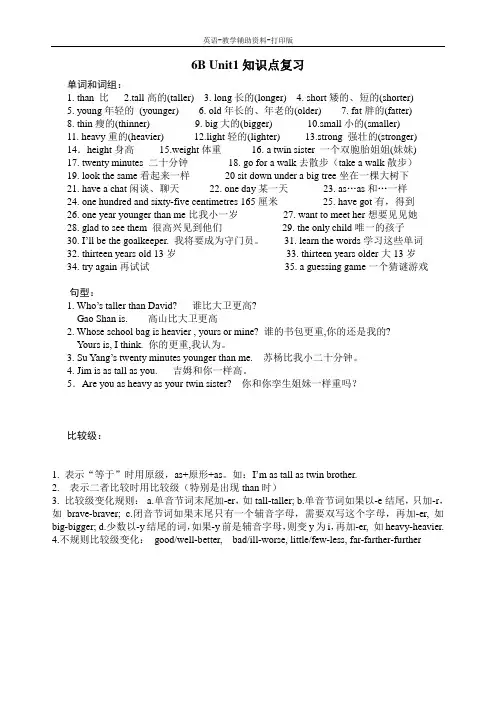
英语-教学辅助资料-打印版6B Unit1知识点复习单词和词组:1. than 比2.tall高的(taller)3. long长的(longer)4. short矮的、短的(shorter)5. young年轻的(younger)6. old年长的、年老的(older)7. fat胖的(fatter)8. thin瘦的(thinner) 9. big大的(bigger) 10.small小的(smaller)11. heavy重的(heavier) 12.light轻的(lighter) 13.strong 强壮的(stronger)14.height身高15.weight体重16. a twin sister 一个双胞胎姐姐(妹妹)17. twenty minutes 二十分钟18. go for a walk去散步(take a walk散步)19. look the same看起来一样20 sit down under a big tree坐在一棵大树下21. have a chat闲谈、聊天22. one day某一天23. as…as和…一样24. one hundred and sixty-five centimetres 165厘米25. have got有,得到26. one year younger than me比我小一岁27. want to meet her想要见见她28. glad to see them 很高兴见到他们29. the only child唯一的孩子30. I’ll be the goalkeeper. 我将要成为守门员。
31. learn the words学习这些单词32. thirteen years old 13岁33. thirteen years older大13岁34. try again再试试35. a guessing game一个猜谜游戏句型:1. Who’s taller than David? 谁比大卫更高?Gao Shan is. 高山比大卫更高2. Whose school bag is heavier , yours or mine? 谁的书包更重,你的还是我的?Yours is, I think. 你的更重,我认为。
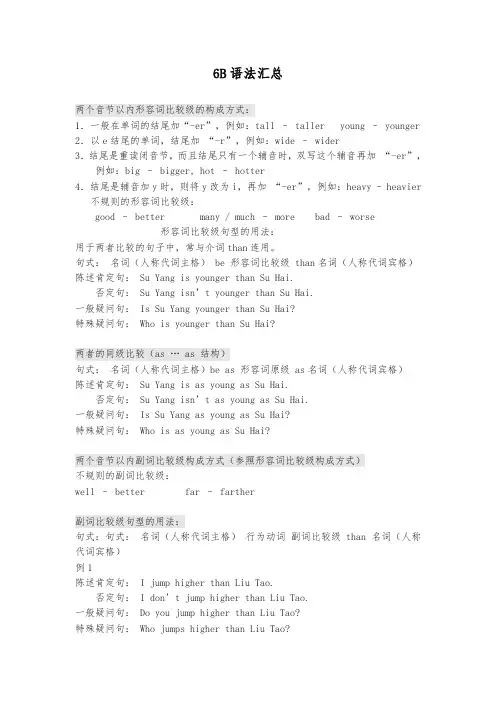
6B语法汇总两个音节以内形容词比较级的构成方式:1.一般在单词的结尾加“-er”,例如:tall – taller young – younger 2.以e结尾的单词,结尾加“-r”,例如:wide – wider3.结尾是重读闭音节,而且结尾只有一个辅音时,双写这个辅音再加“-er”,例如:big – bigger, hot – hotter4.结尾是辅音加y时,则将y改为i,再加“-er”,例如:heavy –heavier 不规则的形容词比较级:good – better many / much – more bad – worse形容词比较级句型的用法:用于两者比较的句子中,常与介词than连用。
句式:名词(人称代词主格) be 形容词比较级 than名词(人称代词宾格)陈述肯定句: Su Yang is younger than Su Hai.否定句:Su Yang isn’t younger than Su Hai.一般疑问句: Is Su Yang younger than Su Hai?特殊疑问句: Who is younger than Su Hai?两者的同级比较(as … as 结构)句式:名词(人称代词主格)be as 形容词原级 as名词(人称代词宾格)陈述肯定句: Su Yang is as young as Su Hai.否定句:Su Yang isn’t as young as Su Hai.一般疑问句: Is Su Yang as young as Su Hai?特殊疑问句: Who is as young as Su Hai?两个音节以内副词比较级构成方式(参照形容词比较级构成方式)不规则的副词比较级:well – better far – farther副词比较级句型的用法:句式:句式:名词(人称代词主格)行为动词副词比较级 than名词(人称代词宾格)例1陈述肯定句: I jump higher than Liu Tao.否定句:I don’t jump higher than Liu Tao.一般疑问句: Do you jump higher than Liu Tao?特殊疑问句: Who jumps higher than Liu Tao?例2陈述肯定句: Liu Tao runs faster than me.否定句:Liu Tao doesn’t run faster than me.一般疑问句: Does Liu Tao run faster than you?特殊疑问句: Who runs faster than you?be going to (do sth.) 打算做某事1)表示现在的意图,即打算在最近或将来进行某事,例如:We are going to post the letter.2)表示现在已有迹象表明将要发生或即将发生某种事态,例如:I must hurry, I’m going to be late.(常与tomorrow, next week, next year等将来时间连用)用法:陈述肯定句:We are going to give a puppet show next week.否定句:We aren’t going to give a puppet show next week.一般疑问句:Are you going to give a puppet show next week? 特殊疑问句:Who is going to give a puppet show next week?What are you going to do next week?。
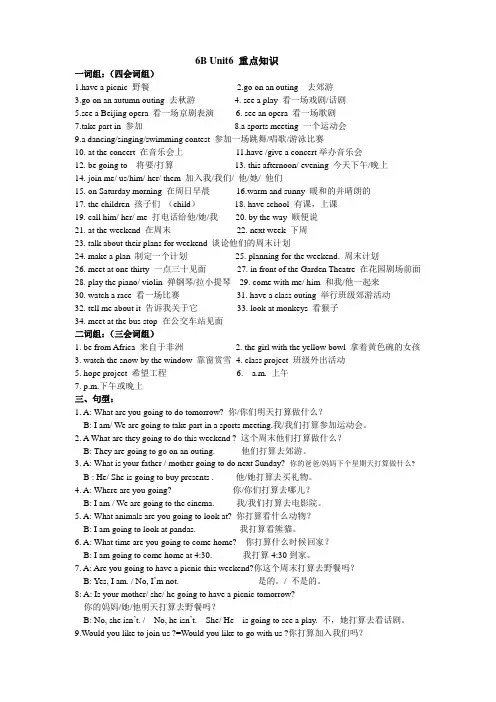
6B Unit6 重点知识一词组:(四会词组)1.have a picnic 野餐2.go on an outing 去郊游3.go on an autumn outing 去秋游4. see a play 看一场戏剧/话剧5.see a Beijing opera 看一场京剧表演6. see an opera 看一场歌剧7.take part in 参加8.a sports meeting 一个运动会9.a dancing/singing/swimming contest 参加一场跳舞/唱歌/游泳比赛10. at the concert 在音乐会上11.have /give a concert举办音乐会12. be going to 将要/打算13. this afternoon/ evening 今天下午/晚上14. join me/ us/him/ her/ them 加入我/我们/ 他/她/ 他们15. on Saturday morning 在周日早晨16.warm and sunny 暖和的并晴朗的17. the children 孩子们(child)18. have school 有课,上课19. call him/ her/ me 打电话给他/她/我20. by the way 顺便说21. at the weekend 在周末22. next week 下周23. talk about their plans for weekend 谈论他们的周末计划24. make a plan 制定一个计划25. planning for the weekend. 周末计划26. meet at one thirty 一点三十见面27. in front of the Garden Theatre 在花园剧场前面28. play the piano/ violin 弹钢琴/拉小提琴29. come with me/ him 和我/他一起来30. watch a race 看一场比赛31. have a class outing 举行班级郊游活动32. tell me about it 告诉我关于它33. look at monkeys 看猴子34. meet at the bus stop 在公交车站见面二词组:(三会词组)1. be from Africa 来自于非洲2. the girl with the yellow bowl 拿着黄色碗的女孩3. watch the snow by the window 靠窗赏雪4. class project 班级外出活动5. hope project 希望工程6. a.m. 上午7. p.m.下午或晚上三、句型:1. A: What are you going to do tomorrow? 你/你们明天打算做什么?B: I am/ We are going to take part in a sports meeting.我/我们打算参加运动会。
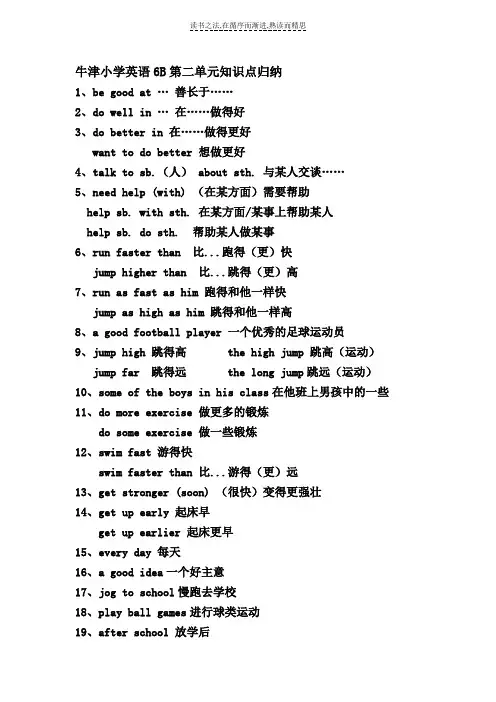
牛津小学英语6B第二单元知识点归纳1、be good at … 善长于……2、do well in … 在……做得好3、do better in 在……做得更好want to do better 想做更好4、talk to sb.(人) about sth. 与某人交谈……5、need help (with) (在某方面)需要帮助help sb. with sth. 在某方面/某事上帮助某人help sb. do sth. 帮助某人做某事6、run faster than 比...跑得(更)快jump higher than 比...跳得(更)高7、run as fast as him 跑得和他一样快jump as high as him 跳得和他一样高8、a good football player 一个优秀的足球运动员9、jump high 跳得高 the high jump 跳高(运动) jump far 跳得远 the long jump跳远(运动)10、some of the boys in his class在他班上男孩中的一些11、do more exercise 做更多的锻炼do some exercise 做一些锻炼12、swim fast 游得快swim faster than 比...游得(更)远13、get stronger (soon) (很快)变得更强壮14、get up early 起床早get up earlier 起床更早15、every day 每天16、a good idea一个好主意17、jog to school慢跑去学校18、play ball games进行球类运动19、after school 放学后20、the other boys 其他的男孩21、at weekends 在周末22、have a lot of fun 玩得开心23、an animals show 一个动物表演24、like...better 更喜欢......like...very much 非常喜欢......25、how about=what about ......怎么样26、skate so well 滑冰滑得这么好swim so beautifully 游泳游得那么美27、be late for ……迟了be late for school 上学迟到28、read better than 比…读得更好all of us/them 我们/他们所有人29、read the new words 读生词30、start/begin our lesson 开始上课31、have an English lesson 上一节英语课32、the sports field 运动场地33.well done 做得好34.around the lake 绕着湖二、重点词汇解析1、be good at(同义词组)do well in2、want(三单形式)wants3、talk(现在分词)talking4、run(三单形式)runs5、true(近义词)real (对应词)false6、low(对应词)high7、slow(对应词)fast/quickly8、high(同音词)hi9、early(对应词)late10、butterfly(复数形式)butterflies三、惯用表达式1、What’s the matter? 怎么了?(用来询问对方出了什么状况,同意句为:What’s wrong?)2、That’s true. 那是真的。
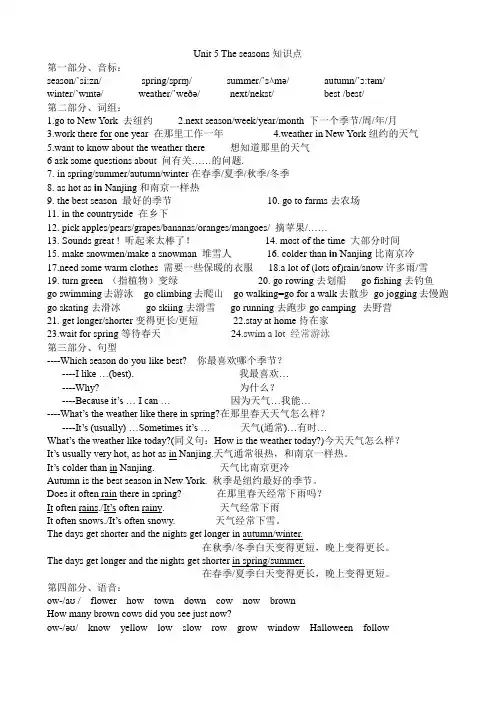
Unit 5 The seasons知识点第一部分、音标:season/`si:zn/ spring/spr Iŋ/summer/`s۸mə/ autumn/`כ:təm/winter/`w I ntə/ weather/`weðə/ next/nekst/ best /best/第二部分、词组:1.go to New York 去纽约2.next season/week/year/month 下一个季节/周/年/月3.work there for one year 在那里工作一年4.weather in New York纽约的天气5.want to know about the weather there 想知道那里的天气6 ask some questions about 问有关……的问题.7. in spring/summer/autumn/winter在春季/夏季/秋季/冬季8. as hot as in Nanjing和南京一样热9. the best season 最好的季节10. go to farms去农场11. in the countryside 在乡下12. pick apples/pears/grapes/bananas/oranges/mangoes/ 摘苹果/……13. Sounds great ! 听起来太棒了!14. most of the time 大部分时间15. make snowmen/make a snowman 堆雪人16. colder than in Nanjing比南京冷17.need some warm clothes 需要一些保暖的衣服18.a lot of (lots of)rain/snow许多雨/雪19. turn green (指植物)变绿20. go rowing去划船go fishing去钓鱼go swimming去游泳go climbing去爬山go walking=go for a walk去散步go jogging去慢跑go skating去滑冰go skiing去滑雪go running去跑步go camping 去野营21. get longer/shorter变得更长/更短22.stay at home待在家23.wait for spring等待春天24.swim a lot 经常游泳第三部分、句型----Which season do you like best? 你最喜欢哪个季节?----I like …(best). 我最喜欢…----Why? 为什么?----Because it’s … I can … 因为天气…我能…----What’s the weather like there in spring?在那里春天天气怎么样?----It’s (usually) …Sometimes it’s … 天气(通常)…有时…Wh at’s the weather like today?(同义句:How is the weather today?)今天天气怎么样?It’s usually very hot, as hot as in Nanjing.天气通常很热,和南京一样热。
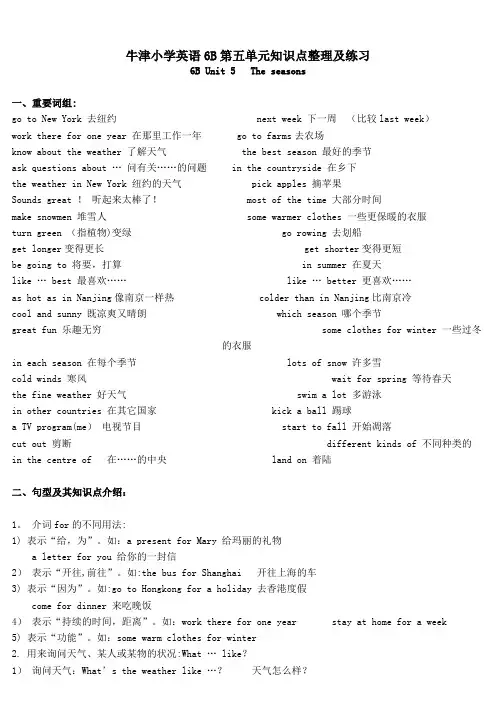
牛津小学英语6B第五单元知识点整理及练习6B Unit 5 The seasons一、重要词组:go to New York 去纽约 next week 下一周(比较last week)work there for one year 在那里工作一年go to farms去农场know about the weather 了解天气 the best season 最好的季节ask questions about … 问有关……的问题in the countryside 在乡下the weather in New York 纽约的天气pick apples 摘苹果Sounds great !听起来太棒了!most of the time 大部分时间make snowmen 堆雪人 some warmer clothes 一些更保暖的衣服turn green (指植物)变绿 go rowing 去划船get longer变得更长get shorter变得更短be going to 将要,打算in summer 在夏天like … best 最喜欢……like … better 更喜欢……as hot as in Nanjing像南京一样热colder than in Nanjing比南京冷cool and sunny 既凉爽又晴朗which season 哪个季节great fun 乐趣无穷 some clothes for winter 一些过冬的衣服in each season 在每个季节lots of snow 许多雪cold winds 寒风wait for spring 等待春天the fine weather 好天气 swim a lot 多游泳in other countries 在其它国家kick a ball 踢球a TV program(me)电视节目 start to fall 开始凋落cut out 剪断different kinds of 不同种类的in the centre of 在……的中央land on 着陆二、句型及其知识点介绍:1。
牛津小学英语六年级6B知识点汇总Unit 1Who is younger?一、单词:**** than 比,chat聊天,young年轻的old年老的strong 强壮的fat 胖的thin 瘦的heavy 重的light 轻的short短的、矮的long 长的tall高的small小的big大的sit(sat)坐meet(met)遇见、见面***twin (双胞胎)之一as 作为minute 分钟only惟一的、仅有的child孩子(children孩子们)little小的cute 伶俐的、可爱的also 也**centimetre 厘米height身高 weight体重worm蠕虫二、词组:1.on Sunday morning 在星期天早晨2.go for a walk 去散步3. look the same 看起来一样4. one day 某一天5.as tall as 与…..一样高as fat as 与…..一样胖as long as 与….一样长6. shorter than…比….矮bigger than比…大heavier than比…重7. twenty minutes younger小二十分钟 8.one year older 大一岁9.sit down under a big tree 坐在大树下 10.be glad to do 非常高兴做某事11.see them/him/you 看见他们/他/你 12.look different 看起来不同13.a twin sister 双胞胎姐妹 14.my classmate/deskmate我的同班同学/同桌15.how old 多大16.the only child 仅有的一个孩子 17.a cutelittle dog一只可爱的小狗 18.get a brother 得了个弟弟19.a tall boy 一个高个子的男孩 20.a young teacher 一位年轻的教师21.some heavyboxes 一些重的盒子 22.whose classroom 谁的教室23.your old friend(s) 你的老朋友 24.a heavy schoolbag 一只重的书包25.a strong goalkeeper 一个强壮的守门员26.brothers and sisters 兄弟姐妹27.the girl in red 穿红衣服的女孩 28.yours or mine 你的还是我的29.look young 看起来年轻 30.have a chat 聊天、闲谈31.asksome queations问一些问题三、形容词比较级:A.直接加er/rtall---________light----________young--_________old---________strong--___small--_________late---_________long---_________short--________B.双写加er big-------_________ fat-----_________ thin---________C.去y改i加er heavy---_________四、句型:1、Who’s younger than him ?谁比他年轻?My brother is younger than him . 我弟弟比他年轻。
牛津小学英语6B词组总汇Unit 1 Who is younger1.on Sunday morning 在周日早上2.go for a walk 去散步3.his cousin 他的表弟4.sit down under a big tree 坐在一棵大树下5.have a chat 聊天6.my classmate 我的同班同学7.a twin sister 一个双胞胎姐妹8.look the same 看起来一样9.be as tall as 和…一样高10.be taller than 比…高11.twenty minutes younger than me 比我小20分钟12.one day 一天13.the only child in one’s family 家里的独生子14.have got a brother 有一个弟弟15.one’s family photo全家福16.the man in black 穿着黑衣服的男士17.be the goalkeeper 做守门员18.thirteen years old 13岁19.165 centimetres 165厘米20.Try again! 再试一次!21.the tall girl in the yellow T-shirt 穿着黄色T恤的高女孩22.grow tall 长高Unit 2 More exercise1.be good at 擅长于…3.do not know how 不知道怎样做4.talk to sb. about sth. 与某人谈论某事5.need help with …需要帮助6.run faster than sb. 比某人跑得快7.run as fast as sb. 和某人跑得一样快8.a good football player 一个出色的足球运动员9.jump very high 跳得很高10.jump higher than sb. 比某人跳得高11.some of the boys in my class 我们班的一些男生12.swim faster than sb. 比某人游得快13.Don’t worry. 别担心14.do more exercise 做更多运动15.get stronger 变得更强壮16.do better in …做的更好17.get up earlier 起得更早18.That’s a good idea. 那是一个好主意。
牛津小学英语6B Unit 7 A penfriend知识点总结一、单词:1. letter信2. penfriend(不见面的)通信朋友;笔友3. glue胶水;胶粘物(不可数)4. paper纸5. envelope信封6. both(两者)都7. address 地址8. all都9. postcard明信片 10. number号码(缩写No.)11. fax 传真;传真机 12. machine 机器13. finish结束;完成 14. wanted [广告用语]征求;招聘15. everything每件事;一切 16. yesterday昨天17. will〔表示将来〕将 18. river江;河19. wish希望,愿望(复数wishes表祝愿) 20. lake湖21. read〔read的过去式〕 22. French法语二、词组:1.write to Peter给Peter写信2.collect stamps收集邮票3.write a letter写一封信4.draw a picture画一幅画5.make a kite做一只风筝6.do my homework做我的回家作业7.write an e-mail写一封电子邮件 8.a fax machine一部传真机9.a telephone number一个电话号码10.some writing paper一些信纸11.an envelope and some stamps一个信封和一些邮票12.a postcard一张明信片 13.yesterday afternoon昨天下午14.finish primary school 小学毕业15.go to middle school 升入中学16.an English boy一个英国男孩 17.in the newspaper在报纸上18.be his penfriend成为他的笔友 19.live in London住在伦敦20.his hobbies他的爱好 21.listen to music听音乐22.make model planes做模型飞机23.have the same hobbies有相同的爱好24.be good friends成为好朋友25.my favourite subjects我特别喜爱的科目26.a good idea一个好主意 27.e-mail address电子邮件地址28.ask for 要求得到 29.at Jinling Primary School在金陵小学30.some other subjects一些其他的科目31.live in a new house住在一座新房子里32.know everything about you知道关于你的一切事情33.write to me soon很快给我写信 34.with best wishes 祝好35.want a penfriend in China想要一个中国的笔友。
教版牛津小学英语6B 词组句子语法unit1一.词组1)在星期天早上:on Sunday morning ( 在星期几的早上/中午/晚上,一定用介词on)2)去散步:go for a walk ( go 的过去式---went; go、for a run: 去跑步,go for a jog: 去慢跑)3)在公园里:in the park4)遇到某人:meet + 人物(英语缩写是sb.)( meet 的过去式--- met)5)高兴做某事:be glad to + 动词原形6)坐下:sit down ( sit 的过去式sat)7)在一棵大树下:under a big tree8)聊天:have a chat (have 的过去式是had)9)孪生姐妹:twin sisters ( 如果只指孪生姐妹中的一个人则应为twin sister, twin brothers 为孪生兄弟)10)看起来一样:look the same ( same 的前面一般一定要加the )11)和…. 一样:as….as ( 中间的词一定要是原形)12)比….更…:…. than ( than的前面一定是比较级)13)小20分钟:twenty minutes younger (小一小时:one hour younger)14)某一天,一天:one day15)想做某事:want to + 动词原形(do)16)any 的意思是“一些”,用在否定和疑问句中,many 用在肯定句中17)唯一的孩子:the only child18)在你的家里:in your family ( 记住这里要用in )19)也:also20)他在这里:Here he is. (这个句子是倒装句,原来的顺序是He is here. 主要本句希望强调“这儿”,所以把here 放在了句首)21)所以:so22)你有一个兄弟:You’ve got a brother. ( You’ve = You have, got 是get 的过去式)23)告诉某人关于某事:tell somebody (sb.) about something(sth.) ( about :关于)24)谁比大卫高?:Who’s taller than David? (这是对人物之间进行比较,句型为:Who’s +比较级+ than…? 回答是:人称代词+ is )25)谁的书包更重,你的还是我的?:Whose school bag is heavier,yours or mine?看到句中有or, 前面一句话里的形容词或副词就要用比较级;句型为:Whose …. is + 比较级,…or…? 回答是:名词性物主代词+ is. /名词所有格+ is. yours 和mine 是名词性物主代词,名词性物主代词一定单独使用,后面不再跟名词。
Unit 1一.短语1. 在星期天的早上on Sunday morning2. 在星期六的下午on Saturday afternoon3.去公园散步go for a walk in the park4.很高兴见到他们(两种)Nice to meetthem/ Glad to see them 5.坐在大树下聊天have a chat under a big tree 6.一个双胞胎妹妹a twin sister7.看起来一样的look the same8.与你双胞胎哥哥一样高as tall as your twin brother 9.比我小二十分钟twenty minutes younger than me10.想要做某事want to do sth 11.家里的独生子the only child in the family12.他在这Here he is.13.告诉某人某事tell sb sth 14.和某人谈话talk with sb15.这个穿着黑衣服的男子the man in black16.苏海的叔叔Su Hai’s uncle17.做一个猜谜游戏play a guessing game 18.看苏海的全家照look at Su Hai’sfamily photo二.句子1.谁更小,你还是我? Who is younger, you or me?2.我与小明的朋友一样高.I’m as tall as Xiao Ming’s friend.3.他比我大三岁. He is three years older than me.4.我比她更幸福. I am happier than her.5.他有兄弟姐妹吗? Does he have sisters or brothers?6.我妈妈说吉米也是他的孩子. My mum says Jimmy is also her child.7.他有一个弟弟. He has a brother.8.我是苏海.你是谁?(电话用语)This is Su Hai . Who is that?9你多大了? How old are you?10.这儿是一些卢灵玉的图片. These are some of Lu Lingyu’s pictures.11.这头大象比那头熊更大. The elephant is bigger than that bear.12.这只猫比那只猫更胖. The cat is fatter than that cat.13.小明的狗比我的狗更瘦. Xiao Ming’s dog is thinner than mine.14.谁的书包更重啊,你的还是我的?Whose bag is heavier, yours or mine?15.我想你的尺比我的尺更长. I think your ruler is longer than mine.16.我正在读书.我的父母正听着我读书.这只狗正看着我.I am reading. My parents are listening to me. The dog is looking at me.17.苏海的叔叔比他的爸爸更高更强壮.Su Hai’s uncle is taller and stronger than his father.18.大家都想做足球守门员. Everyone wants to be the football goalkeeper.19.看这些图片,读他们正在说的话.Look at the pictures and read what they are saying.20.我要做最好的学生. I want to be the best student.21.我的朋友比玛丽高三厘米,重九千克,大三岁.My friend is three cm taller and nine kg heavier and three years older than Mary.Unit 2一.短语1.让我们做更多的运动let’s do more exercise2.擅长于英语和数学be good at English and Maths3.体育方面做得不好don’t do well in PE4.想要做的更好want to do better5.帮助我做功课help me with my lessons6.跑得比我快run faster than me 8.别担心Don’t worry7.我们班的一些同学some of the students in my class 13.在周末at weekends9.每天起床更早get up earlier every day10.早晨跑步到学校jog to school in the morning 11.放学后做球类运动play ball games after school12.与其他的男生一样强壮as strong as the other boys14.写出你所看到的write what you see 15.很多的乐趣a lot of fun16.上他们的英语课have their English lesson17.这节课的新单词the new words for the class18.穿着红白相间的短裤in red and white shorts二.句子1.他想做的更好,但不知道该怎样做.He wants to do better, but doesn’t know how.2.他正在和他的爸爸妈妈谈论这件事.-He is talking to his dad and mum about it.3.你怎么啦? What’s the matter with you?4.我体育方面做得不好.I’m not doing well in PE.5.Ben 跑得比我快.Mike跑得和Ben一样快,他还是个好的足球运动员.Ben runs faster than me. Mike runs as fast as Ben, and he is a good football player too6.我想你跳得比她更高.I think you jump higher than her.7.我跳得比我们班的大多数女生更高.I jump higher than most of the girls in my class.8.但是我的朋友们游得比我快.But my friends swim faster than me.9.我喜欢做眼保健操。
牛津小学英语6B Unit3 Asking the way知识点归纳一、词组:e from 来自于(be from)2.live in China 住在中国3.visit the History Museum参观历史博物馆4.how to get there怎样到达那里5. know the way 认识路6.ask the way 问路7.tell me the way to 告诉我去……的路8.let me see 让我想想9.go along this street 沿着这条街走10.turn right / left 向右/ 左转11.at the third crossing 在第三个十字路口12.on your left 在你的左边13.You cant miss it.你不会错过它。
14.how far 多远15.a kilometre away 一公里远16.a long/short walk 一段很长/短的路17.take bus No. 5乘5路车18.how many stops 多少站19.at the bus stop 在公共汽车20.every five minutes 每隔五分钟21.on Zhongshan Road 在中山路 22.in Shanghai Street 在上海大街23.get on 上车 24.get off at the third stop 在第三个车站下车25.You’re welcome. 不客气/不必谢。
26.Bank of China 中国银行st Sunday afternoon 上个星期天下午28.a map of the town小镇地图29.a shopping centre一个购物中心30.a middle school一所中学31.a history museum一个历史博物馆32.a post office 一个邮局33.a primary school一所小学34.a train station一个火车站35.a bus station一个长途汽车站36.Stop thief! 抓贼!37.get…back 把……拿回来38.That’s all right.不用谢。
苏教版牛津小学英语6B 词组句子语法unit1一.词组1)在星期天早上:on Sunday morning ( 在星期几的早上/中午/晚上,一定用介词 on)2)去散步:go for a walk ( go 的过去式---went; go for a run: 去跑步,go for a jog: 去慢跑)3)在公园里:in the park4)遇到某人:meet + 人物(英语缩写是 sb.) ( meet 的过去式--- met)5)高兴做某事:be glad to + 动词原形6)坐下:sit down ( sit 的过去式 sat)7)在一棵大树下:under a big tree8)聊天:have a chat (have 的过去式是 had)9)孪生姐妹:twin sisters ( 如果只指孪生姐妹中的一个人则应为twin sister, twin brothers 为孪生兄弟)10)看起来一样:look the same ( same 的前面一般一定要加the )11)和…. 一样:as….as ( 中间的词一定要是原形 )12)比….更…:…. than ( than的前面一定是比较级)13)小20分钟:twenty minutes younger(小一小时: one hour younger)14)某一天,一天:one day15)想做某事:want to + 动词原形(do)16)any 的意思是“一些”,用在否定和疑问句中, many 用在肯定句中17)唯一的孩子:the only child18)在你的家里:in your family ( 记住这里要用in )19)也:also20)他在这里:Here he is. (这个句子是倒装句,原来的顺序是 He ishere. 主要本句希望强调“这儿”,所以把 here 放在了句首)21)所以:so22)你有一个兄弟:You’ve got a brother. ( You’ve = You have, got 是 get的过去式)23)告诉某人关于某事:tell somebody (sb.) about something(sth.)( about :关于)24)谁比大卫高?:Who’s taller than David? (这是对人物之间进行比较,句型为:Who’s +比较级+ than…? 回答是:人称代词+ is )25)谁的书包更重,你的还是我的?:Whose school bag is heavier,yours or mine?看到句中有or, 前面一句话里的形容词或副词就要用比较级;句型为:Whose …. is + 比较级,… or…? 回答是:名词性物主代词+ is. /名词所有格+ is. yours 和mine 是名词性物主代词,名词性物主代词一定单独使用,后面不再跟名词。
在本句中,yours= your school bag, mine = my school bag26)让我们:let’s (= let us),27)我将当守门员:I will be the goalkeeper. (我将当歌星:I will be ateacher.)28)你的还是我的:yours or mine29)bird, girl, skirt, shirt, third : 这里的ir 的发音是:[ə:]30)big – bigger, fat—fatter, thin- thinner, late—later,31)heavy – heavier , happy – happier, early – earlier,二、句子1谁更年轻,你还是苏洋? Who’s younger, you or Su Yang? 2你和你的双胞胎妹妹/姐姐一样高吗? Are you as tall as your twin sister ?3 你有一些兄弟或姐妹吗?不,没有。
Do you have any brothers or sisters? No. I don’t.4 谁的书包更重,你的还是我的? Whose schoolbag is heavier, yours or mine ?我的书包 Mine is./My schoolbag is heavier than yours .5 我和你一样高。
I’m as tall as you.6 苏洋比我年轻20分钟。
Su Yang is twenty minutes younger than me.7 谁比大卫更高? Who’s taller than David?高山比大卫更高。
Gao Shan is taller than David.三、初步理解掌握本课语法知识1.形容词修饰名词(通常跟be动词后),副词修饰动词(通常跟行为动词后)。
形容词和副词有三种形式:原级、比较级、最高级。
a. 原级比较:as 形容词/副词原形 as,b. 比较级:形容词/副词+er +than形容词、副词比较级的规则变化如下:(1)直接+er。
如:tall - taller, fast - faster(2 ) 以e结尾+r。
如:late - later(3)重读闭音节词+(双写)er。
如:big - bigger, fat – fatter, thin-thinner, hot-hotter, red-redder(4)以辅音字母加-y结尾的词,变y为i,再加-er。
如:heavy - heavier, early – earlier,(5)双音节和多音节词的比较级应在原级前加more构成。
如:beautiful - more beautiful,careful - more careful, quietly - more quietly, interesting - more interesting(6)有些不规则变化的,须逐一加以记忆。
如:good/well – better, many/much – more, far – farther2. 形容词比较级句式肯定句:A + is/are/am +(修饰成分)+ 形容词比较级+ than + B如: She is taller than me. 她比我高。
She is (5centimetres)taller than me. 她比我高5厘米。
疑问句:Is/are/Am+ A + 形容词比较级+ than + B?如: Is she(5centimetres)taller than me? 她比我高5厘米吗?否定句:A + is/are/am +not+(修饰成分)+ 形容词比较级+ than + B如:She is not(5centimetres)taller than me? 她比我高5厘米吗?特殊疑问句Who/Which +is/are+比较级+ than+ A? I am. / You are. / … is. Whose …is/are +比较级,…’s or …’s ?…’s is/are.3. Yours _____ bigger than mine.答案:is, are 都可以,关键看yours指的东西是单数还是复数4.second=秒,minute=分钟,hour=小时,half an hour=半小时5. only(唯一)+名词单数= the only photo= 唯一的照片6. Do you have any brothers or sisters?在疑问与否定句中,“一些”经常用any,连接词经常用or7also=too=也,also 用于句中,too 用于句末 too(太) big= 太大8. in+颜色=穿着…颜色的衣服 the man in black=穿着黑色的衣服男士with+某人器官=长着…样子 the man with big ears=大眼睛的男士6B unit21)善于:be good at (be 要根据前面的人称和时态进行相应的变化)2)在某方面做的好:do well in ( do 也是要根据前面人称和时态进行相应的变化)3)告诉某人关于某事:talk to somebody(sb.) about something(sth.)( about: 关于, somebody 的缩写为 sb., something 的缩写为 sth.)4)某人怎么了/某人有什么问题吗?:What’s the matter with somebody ? = what’swrong with somebody? ( the matter 可以换成 wrong, 人物的前面一定是with )5)在我班级里的一些男孩:some of the boys in my class ( some of the boys ,some 在这里是名词,后面跟of的时候,一定在名词前面要加 the , 例如:some of the teachers , some of the workers )6)在某方面需要帮助:need help with …..( 请注意这里的with , 在某个方面需要帮助)7)足球运动员:football player (记住这里的 player 是运动员的意思,依次类推,其他球类的运动员都可以用球类名称+player )8)那是真的。
/那是事实:That’s true.9)不要担心:Don’t worry.10)多做些运动:do more exercise11)做些运动:do some exercise12)上学/去学校:go to school ( 回家:go home)13)那是个好主意:That’s a good idea.14)慢跑:jog15)在早上:in the morning (请注意:这里需要用的词是in, in的后面一定要加个the, 在下午/晚上— in the afternoon/evening, 没有说明是具体哪天,就用in , 但是,如果有说明具体的哪天,就不用in, 而要用on, 在3月29日早上:on March 29 morning….)16)放学后:after school17)男孩子们比女孩子们跳得高吗?:Do the boys jump higher than the girls?18)大卫游泳比吉姆慢吗?:Does David swim slower than Jim?19)参观/游览某地:visit + 地点 (参观动物园:visit the zoo)20)迟到:be late (你迟到了:You’re late. He’s late.We’re late.)21)不要迟到:Don’t be late. (这个句子是祈使句,就是给出指示或命令的句子,一般句子不用主语)22)我们(做什么事)好吗:Shall we …..?(shall we + 动词原形,我们开始,好吗?--- Shall we start? , 我们看电视,好吗?--- Shall we watch TV? )23)想,想要:would like ( would like + 名词或 would like + to+ 动词原形I would like a new car./ I would like to buy a new car. )24)我们全部:all of us25)请你/你们….好吗?:Would you …. please? ( would you + 动词原形,Would you leave, please? )26)你错了:You are wrong.27)干得好!:Well done!28)forty, horse, morning, sports [ɔ:]29)good/well—better, bad/ill – worse, far – farther, little/few – less,old—older, eldermany/much—more二.句子1本跑得比吉姆快。